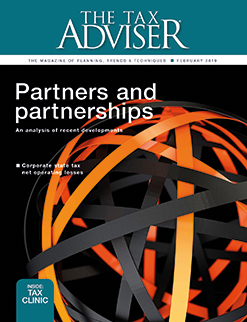- column
- From the Tax Adviser
Bonus depreciation now available for used property
Please note: This item is from our archives and was published in 2019. It is provided for historical reference. The content may be out of date and links may no longer function.
Related
Businesses urge Treasury to destroy BOI data and finalize exemption
How to ease taxes on inherited IRAs
Company lacks standing to sue ERTC advisers
TOPICS

Bonus depreciation in Sec. 168(k) allows an additional first-year depreciation deduction in the placed-in-service year of qualified property. Legislation through the years has modified the bonus depreciation percentage (now 100%) and property that is considered to be “qualified.” In August 2018 the IRS issued proposed regulations to provide guidance on changes made by the law known as the Tax Cuts and Jobs Act (TCJA), P.L. 115-97, to bonus depreciation in Sec. 168(k) (REG-104397-18).
One of those changes was eliminating the “original use” requirement, so that taxpayers can now claim bonus depreciation on used property that they acquire (Sec. 168(k)(2)(E)(ii)). The proposed regulations provide new rules and definitions for applying bonus depreciation to such acquisitions of used property. Such property may not have been used previously by the taxpayer (or its predecessor) and cannot be acquired from a related party or in certain tax-free transactions. There is a special rule for members of a consolidated group.
Most importantly, the proposed regulations define previous use as having a “depreciable interest in the property at any time prior to such acquisition.” That rule applies whether or not the taxpayer actually claimed deductions for depreciation. As written, the definition is very broad, and the proposed regulations provide some helpful examples for applying this test.
For example, if a taxpayer initially acquires a depreciable interest in 50% of an asset and subsequently acquires an additional depreciable interest in the same property, the proposed regulations provide that the additional depreciable interest is not treated as being previously used by the taxpayer. However, if the taxpayer had sold its original 50% interest in the asset and subsequently acquired a different 50% interest in the asset, that new portion (up to the amount for which it had previously held an interest) is treated as being previously used by the taxpayer.
Another example provides that if a lessee acquires the property it is leasing, the additional basis acquired in the property (over the lessee’s own improvements to the property) may be eligible for bonus depreciation.
The proposed regulations also have special rules for when to test whether property is acquired from a related party, including special rules for consolidated groups. Several examples are very helpful.
While the proposed regulations clarify the used property acquisition requirements, they create several new burdens and questions for taxpayers to consider. The rule appears to require tracking of every asset ever owned by the taxpayer or its predecessor from prior to the TCJA until such time as bonus depreciation is phased out or the used property rules are changed. This tracking will be burdensome to large and small taxpayers alike. It may raise questions such as the following:
- Is the benefit of 100% bonus depreciation on used property valuable enough to justify the tracking burden, or should the taxpayer elect out of bonus depreciation? (Keep in mind that used property is not a separate category for the election out. A taxpayer would have to elect out for both new and used property in each category for which the taxpayer purchased used property.)
- Is there a reasonable method of tracking that can reduce the burden? And how would it be applied to assets that could have been owned by the taxpayer in the past?
- What if the property is substantially or significantly altered or modified between the previous use and current reacquisition? Does some or all of that property qualify for bonus depreciation?
For a detailed discussion of the issues in this area, see “Tax Clinic: Proposed Bonus Depreciation Regs. Provide Answers, Create New Questions” in the February 2019 issue of The Tax Adviser.
— Sharon Kay, CPA, and Caleb Cordonnier, CPA
The Tax Adviser is the AICPA’s monthly journal of tax planning, trends, and techniques.
Also in the February issue:
- A discussion of developments affecting partners and partnerships.
- An analysis of corporate state tax net operating losses.
- A look at service levels on the IRS Practitioner Priority Service line.
AICPA members can subscribe to The Tax Adviser for a discounted price of $85 per year. Tax Section membership includes a one-year subscription to the The Tax Adviser.


















